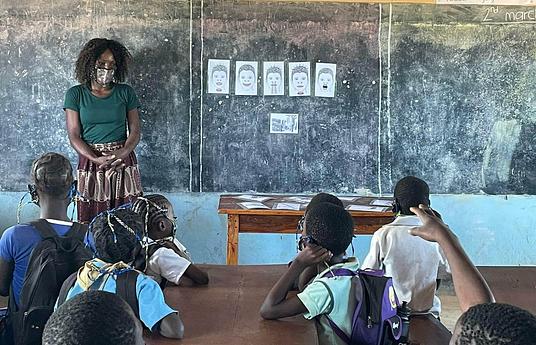90–95% of deaf children are born to hearing parents, the majority of whom do not know or learn sign language (Shantie & Hoffmeister, 2000). As a result, school is often the first place where they encounter an accessible language. Yet, teaching and learning materials are inaccessible and teachers are not fluent in sign language to support language acquisition and effectively deliver the curriculum. This lack of access has long-term implications on literacy, cognitive, social and emotional development, ultimately hindering academic success (Murray et al., 2019).
To address this critical gap,we pioneered the Digital StoryTime (DST) in Kenya, aimed at transforming education for deaf learners. DST offers stories in Kenya Sign Language (KSL) captivatingly narrated by fluent Deaf signers with captions, glossaries, comprehension questions and human narrated audio, making them accessible to mainstream learners alike. DST builds early language acquisition and communication skills on a path to literacy. However DST videos do not work in isolation. We employ a multi-pronged approach to further support language and literacy for deaf learners by:
1. Employing Deaf teachers fluent in Kenyan Sign Language (KSL),
2. Delivering Continuous Professional Development (CPD) to educators, and
3. Utilizing a research-based Sign Language Acquisition Assessment Tool to monitor learning gains.
These ingredients create sign language rich environments that support their holistic development.
Digital StoryTime is multifaceted. Leveraging on Kenya’s Digital Literacy Program, DST content is uploaded directly to school devices to reach learners in schools. Teachers are trained in Bilingual Deaf Education, Universal Design for Learning (UDL) practices on how to integrate DST content in their lessons to facilitate utilization in the classroom. It is accompanied by an adapted Sign Language Acquisition Assessment tool that measures learners’ language development and provides avenues for interventions for those lagging in their language and literacy milestones through targeted individual Language Plans.
DST is also distributed through broadcast TV, Youtube and eKitabu’s e-reader app. At home, deaf children and their families can engage with the content of learning Sign Language and practising vocabulary supporting families to improve their communication and bonding. The Interactive elements in DST such as story comprehension questions and glossaries deepen the learning experience, making literacy accessible and enjoyable for diverse learners. This also gives the public an opportunity to learn sign language - contributing to building inclusive communities.
DST was launched in 2020 as a response to school closure due to Covid-19 pandemic and learning went remote yet learners who are deaf were left out. It was first broadcasted on EDU channel TV operated by the Kenya National Institute of Curriculum Development (KICD) reaching over four million households, including rural and disadvantaged communities . In 2021-2022 we did a pilot study in two schools for the Deaf in Nairobi to assess the impact of creating Sign Language rich environments on learning outcomes. Based on the positive results from the pilot, we scaled to 5 additional schools in 2023, 10 additional schools in 2024 and 26 schools in 2025 directly reaching over 1,200 learners, engaging over 100 teachers and also providing employment to 26 Deaf teachers.
Since 2022 DST has been broadcasting on Akili TV - Kenya’s premier family broadcasting station reaching over 12M people in its first year of broadcast, according to geopoll. To date we continue receiving positive reviews with current weekly viewership standing at 6M, bringing families and communities together enabling increased engagement with accessible, home-friendly learning resources. Through feedback, continuous research, and working alongside education institutions we are scaling DST and sign ;language rich environments beyond Kenya to Rwanda and Malawi.
Yes. Building on feedback, research, and lessons learned over the past seven years. We are currently producing a new season of DST that is not just a continuation — it's an evolution. This will increase access not only to learners who are deaf, but will include additional accessibility features like image descriptions to support learners with visual impairment. We are also exploring the potential of AI to support assessment and provide real-time feedback to both learners and teachers - improving efficiency and cost effectiveness. Additionally we are prototyping an app that can support personalization while being conscious of the limitations and additional access barriers this may bring. However we remain committed to providing access to learning materials to reach as many learners as possible.
As an addition to creating sign language rich environments at home, we are actively building partnerships with other stakeholders to involve parents more, knowing that family support is key for deaf children learning language.
DST is accessible in multiple platforms
1. Visit eKitabu’s website https://www.ekitabu.com/studioksl or watch these episodes on YouTube
2. Tune into Akili TV - Broadcast 7 days a week Monday to Friday 3:30pm. Saturday to Sunday 9am
3. Tune into EDU TV Channel in Kenya
4. The schools we are working with in Kenya, we have loaded the DST videos in their devices. Teachers and learners access through Epubs. They simply select the videos they want to use based on title, grade and category.



